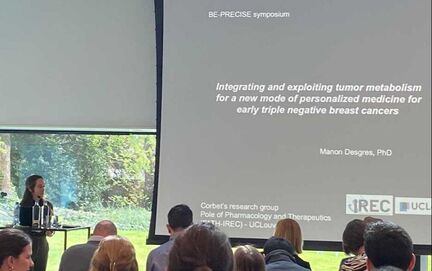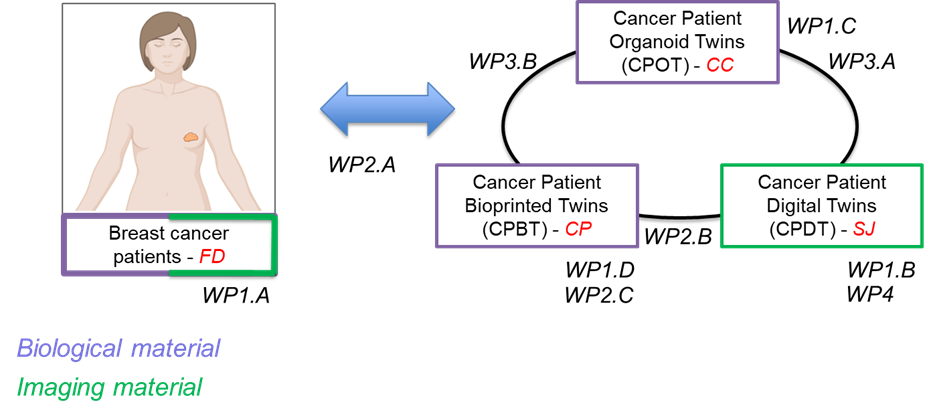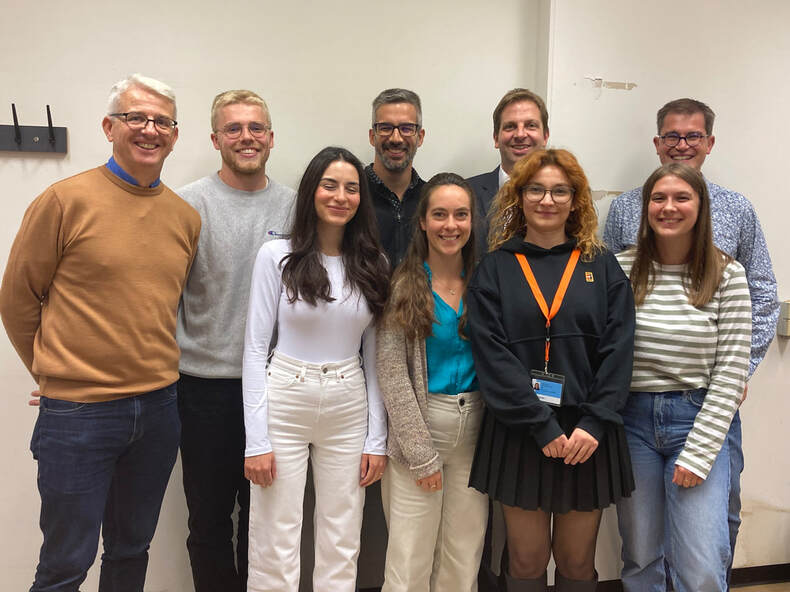Our project entitled "Biological and digital tumour twins to unravel breast cancer progression and response to therapy (BiDiTwins)" has been funded for a 5-year period (2023-2028) by the Research Administration from UCLouvain.
NEWS
April 2024 - Oral presentation (selected from abstracts) for Manon Desgres at the Belgian Precision and Personalized Oncology Meeting (BE-PRECISE) (Antwerp)
December 2023 - Media coverage of BiDiTwins research project in "Daily Science"
PUBLICATIONS
Derouane F*, Desgres M*, Moroni C, Ambroise J, Berlière M, Van Bockstal MR, Galant C, van Marcke C, Vara-Messler M, Hutten SJ, Jonkers J, Mourao L, Scheele CLGJ, Duhoux FP, Corbet C. Metabolic adaptation towards glycolysis supports resistance to neoadjuvant chemotherapy in early triple negative breast cancers. Breast Cancer Res. 2024 Feb 19;26(1):29. doi: 10.1186/s13058-024-01788-8. *co-first authors. PubMed
GOALS OF THE BIDITWINS PROJECT
Breast cancer (BC) is the most prevalent cancer and the leading cause of cancer-related deaths among women worldwide. Most patients are diagnosed with early-stage (non-metastatic) BC and show a high 5-year relative survival rate. In the last decade, neoadjuvant chemotherapy (NAC) has become the new standard of care for high-risk patients with early BC. Unfortunately, around 30% of patients with early-stage BC relapse months or years later and progress towards incurable, advanced diseases. To date, the most frequent BC subtype (i.e. hormone receptor-positive (HR+), human epidermal growth factor receptor 2-negative (HER2-)), which accounts for 65%-70% of all invasive breast carcinomas, is the subtype with the poorest response to NAC. The potential relapse and the poor response to NAC of this BC subtype, associated with the complexity (and limitation) of current imaging-, histology- and genomic-based profiling, impose the development of reliable predictive models to improve clinical management and decision-making.
In this context, the long-term goal of our BiDiTwins project is to develop a “computer/bench to bedside” approach to overcome NAC resistance and prevent BC relapse. To reach this goal, our consortium aims to develop biological and digital twins of early-stage BC in order to reveal spatially- and temporally-resolved molecular and histological changes upon treatment with NAC. More specifically, we will apply emerging in silico models, 3D bioprinting and organoid culturing technologies to unravel how metabolic and signalling heterogeneities within BC tissues promote the phenotypic evolution of human HR+/HER2- BC and acquisition of resistance to NAC. At the end of this project, we should have developed imaging, in silico and in vitro tools to (i) carry out drug screening within a clinically relevant timeframe, (ii) to envision the clinical application of new anticancer treatments (i.e. assay-guided treatment) and (iii) to predict clinical responses for the benefit of BC patients (see Figure and Gantt chart below).
In this context, the long-term goal of our BiDiTwins project is to develop a “computer/bench to bedside” approach to overcome NAC resistance and prevent BC relapse. To reach this goal, our consortium aims to develop biological and digital twins of early-stage BC in order to reveal spatially- and temporally-resolved molecular and histological changes upon treatment with NAC. More specifically, we will apply emerging in silico models, 3D bioprinting and organoid culturing technologies to unravel how metabolic and signalling heterogeneities within BC tissues promote the phenotypic evolution of human HR+/HER2- BC and acquisition of resistance to NAC. At the end of this project, we should have developed imaging, in silico and in vitro tools to (i) carry out drug screening within a clinically relevant timeframe, (ii) to envision the clinical application of new anticancer treatments (i.e. assay-guided treatment) and (iii) to predict clinical responses for the benefit of BC patients (see Figure and Gantt chart below).
Figure: Experimental workflow of BiDiTwins. Schematic illustration of the unique "combination" of clinical, biological and digital breast cancer specimens that will be used within the 4 work packages, under the direct supervision of the 4 co-promoters.
RESEARCH CONSORTIUM
BiDiTwins gathers one clinician, two experimentalists and one theoretician with expertise in breast cancer, molecular and cellular biology, imaging and mathematical modeling.
- Cyril Corbet (CC) is a FNRS Research Associate at the Pole of Pharmacology and Therapeutics (FATH) from the Institut de Recherche Expérimentale et Clinique (IREC) at UCLouvain.
- François Duhoux (FD) is a Clinical Professor at UCLouvain and a medical oncologist heading the Breast Clinic at CUSL. He is also part of the Pole of Medical Imaging, Radiotherapy and Oncology (MIRO) from IREC-UCLouvain. He has a clinical research mandate from the Fondation contre le Cancer.
- Sébastien Jodogne (SJ) is an Assistant Professor in the field of computer science applied to life sciences in the Institute for Information and Communication Technologies, Electronics and Applied Mathematics (ICTEAM) at UCLouvain.
- Christophe Pierreux (CP) is a Professor of Histology and Cell Biology at UCLouvain, and Head of the Cell Biology Pole at the de Duve Institute.
|
PhD students:
Melis Poyraz Buse Sari David Schell Juliette Vanderhaeghen |
Post-doc:
Manon Desgres Clinical Research Associates: Nathalie Blondeel Elodie Villar |



